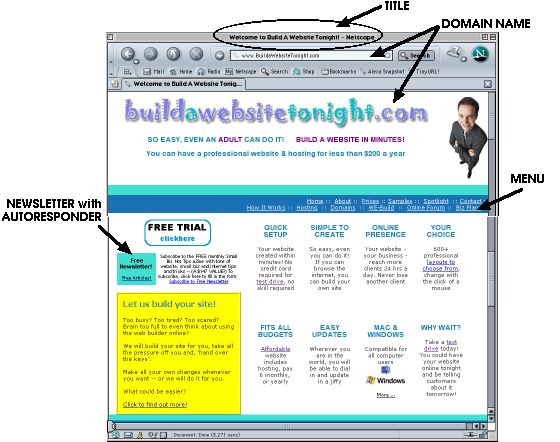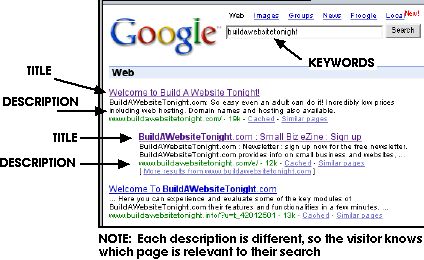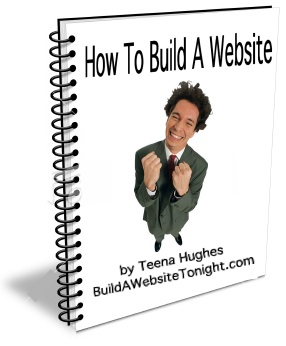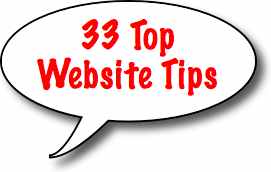How To Plan A Website
Planning a website doesn't have to be scary ...
So you've decided you need to know more about websites, and you might even be ready to set one up. But you don't know what you don't know, and it's all a bit daunting.
Let me take the pain out of this often confusing phase ... I will explain the basic things you need to consider before you start building your website, so you can do some of the legwork in advance, and you'll be more prepared when you start using the web builder.
First of all, let me explain the bits and pieces in an easy to understand way.
If your website is your business, then ... the WEBSITE is your SHOP or OFFICE and you will need to read the following:
|
This: |
Address | Office / Shop | Rooms | Door | Building Manager |
| equals this: | Domain / website name |
Hosting | Web pages | Bandwidth | Someone to update website |
You and your customers also need:
| This: | Transport [like a car] |
Letterbox / PO Box |
Answering machine | Postman |
| equals this: | ISP [internet service provider] for dial-up or broadband |
Email name |
Autoresponders [automatic responses to customers] |
CGI scripts to process and translate forms |
If you sell products or services (online store) you may need to consider:
| This: | Shopping basket |
Cash Register |
Advertising | ?? |
| equals this: | Shopping Cart | Merchant Account | Search engine optimisation | ?? |
OK - that sounds like a lot, doesn't it?
Well you don't need all of it at once, you can add bits and pieces when you're ready.
So now you know what it takes to make up a website, let's look at what you need to know about the pages themselves.
First of all, let's look at the parts of a webpage

Some of these are "behind the scenes" and don't appear on the page, like Title [appears in border and in search engine], Keywords and Description [both appear in search engine].
Click on each of the following topics to read more about it:
- the TITLE of a webpage
- the KEYWORDS "behind the scenes"
- the DESCRIPTION of each page which appears in search engines
- the PAGE CONTENTS
- the DOMAIN NAME or WEBSITE NAME
- the EMAIL NAMES
- the HOSTING
- ISPs & Getting Online
- HOW SEARCH ENGINES know what to print about your site
- download the website plan
The TITLE - the bit at the top of the webpage in the border
Whether you create your web pages using HTML [Hypertext Markup Language], a WYSIWYG Editor [What you see is what you get] like Dreamweaver, or a web builder like this website, you will need to plan the TITLE for each page of your website.
The TITLE is the bit which appears at the top of the web browser, and is a description of the page or website.
The TITLE for each page needs to be different, because it appears in search engines [more on this below]. As you move through one website, notice how the TITLE in the browser border changes. Perhaps you've never noticed this before, so now it's time to understand this is important for search engines and for your website visitors.
Here is a sample of four webpages on this website - notice how the TITLE for each page is slightly different, and reflects the contents of the page:

I'd like you to start thinking about the different TITLES you can have for each of your webpages. This is quite important because the TITLE is the first thing which appears in search engine results when your site gets listed. [TIP: there is a document to download where you can start to type or write the information you need to gather for your website - you can download it now or later.]
![]() Back to List
Back to List ![]()
The KEYWORDS - behind the scenes
What are keywords? Let's think about this for a minute ... when you go to a search engine, what do you type? Did you know the words you type to search with are known as keywords? It is these words which help search engines find pages which match the words typed by someone searching online.
OK, so let's think about this. If people type keywords into a search engine, wouldn't it be a good idea to have those same keywords on your website? Now it's difficult to put ALL the keywords on any one of your pages, so these keywords are "behind the scenes" in the HTML of your web pages.
I'd like you start thinking of all the words and phrases you might type to find YOUR website when it's online. Now I'd like you to start thinking of all the words and phrases a total stranger might type to find YOUR website when it's online. Hmm, the list got longer, didn't it?
When you download the document I mentioned above, you can start typing some of those keywords to use later.
Go back to your list every now and then, and add more words and phrases.
[Note: many people believe keywords are no longer necessary, and they're right - some search engines don't use them anymore, but other search engines DO, so let's help them as much as we can!]
[TIP: also put down plural words and phrases.]
![]() Back to List
Back to List ![]()
The DESCRIPTION - the bit which appears in the search engine results
Ahhh, this is where you really need to put your thinking cap on!
When you do a search on search engines, and you get results, those few lines describing each website are called the DESCRIPTION. It doesn't appear on the webpage, but is written in html "behind the scenes".
Now I need you to start thinking about each page of your website.
If someone did a search for keywords related to your kind of website, and ten of your pages appeared in the search engine results, what would YOU like to see as a description for each page, so the person searching will pick *your* DESCRIPTION and come visit YOUR site?
You'll be able to type up these descriptions and tweak them till you're happy with them, before you start building your website. You can type the descriptions into the document you can download from this page.
Is your brain hurting yet? Haha, I hope not! Even though it might seem overwhelming, it really is very, very important to plan *how* your website appears on search engines, and whether or not it will entice web visitors to click on the links for your website, rather than the others in the search results.
See how important all this is? Good, I'm glad you understand ... now you won't mind filling in that document at all, will you?
![]() Back to List
Back to List ![]()
The WEB PAGE CONTENT - the bit which makes your visitors keep reading
This is the easy bit!
Content simply means the words which will appear on each web page.
The explanation is easy, and now it's up to you to make the words sing and grab your visitor, make them want to read on, to explore your site!
I have to tell you, there's not much which makes my heart sing more than checking my web statistics to find someone has looked at 20 or 30 of my web pages at a time!
Imagine your visitor found three websites with the same keywords, and your site is one of them ...
- How would you *talk* to them about your products and services? In a friendly and open way, to encourage them to visit the rest of your website?
- What would you say which might convince them of your terrific products and services, and your unfailing after-sales-service?
- What would make YOU keep reading a website you are interested in? How would you like to feel after reading the pages?
- Which words or phrases would make you feel the website owner is genuine?
- What else about the site would give you confidence this isn't a fly-by-night website? An address and phone number?
Think about all these questions, and ponder long and hard ... it's easy to get people to come to the website, but HOW do you make them stay? WHAT do you need to DO or SAY?
Now that I've given you a few things to consider, why not start writing a page or two and see how you go? Ask friends and acquaintances for their honest opinion on your words, and don't take offence ... listen to what everyone has to say, and then decide what feels right for *you*.
![]() Back to List
Back to List ![]()
The DOMAIN NAME - how clients can see your website online
Domain name. Website name. Online "address". Business name. Your online IDENTITY.
Give a lot of thought to your domain name before you register it, look at it from all angles:
- can the name be misconstrued?
- is it a name people will easily remember?
- does it make *sense*?
I have seen some disastrous domain names, others made up of initials which made no sense and which no-one could ever remember. Think of a name which will stick in people's minds - google is a great example, yahoo is another. Ask friends what they think of your proposed domain name.
If you'd like to check for possible domain names, you can do that here. A new window will open for the search, and this one will remain open for you to come back to.
The EMAIL NAME - how clients can write to you
One of the greatest inventions since sliced bread!
I can't live without email, can you?
When you have your new website, you must create an email name which matches the domain name to create a professional impression.
Nothing looks more unprofessional than an email name which ends in hotmail.com or one of the other free or ISP names - but don't worry if this is what you currently have, we can help you fix it..
When you buy a website with us, we show you how to easily make as many new email names as you need which will match your website name. Easy!
It's a good idea to put your email name on your website, either on each page, or on the Contact Us page, so that your potential customers can easily contact you to make enquiries.
![]() Back to List
Back to List ![]()
The HOSTING - the physical space on a computer where your website *lives*
Hosting means paying rent for space on a computer which is connected to the internet for the benefit of housing websites - this computer is called a SERVER or HOST, and provides HOSTING.
Websites purchased through Build A Website Tonight are hosted on our servers in the USA, our clients live in different countries, and domain names can be purchased through us or through other domain reseller companies in any country.
Isn't it amazing how the internet makes all this possible?
![]() Back to List
Back to List ![]()
ISPs and Getting Online
There are several ways of getting online, the most common used to be by signing up for a dial-up account with an ISP [Internet Service Provider]. These days you can sign up for Broadband or ADSL or NakedDSL - or even Wireless - all of which means you have permanent internet connection without dialling in using your phone line.
Broadband, ADSL, NakedDSL and Wireless all have advantages, like being able to be online and also receive phone calls on your normal phone at the same time - it can be a bit more expensive than a simple dial-up account, but a definite plus is that you don't get booted off after 4 hours, like a lot of dial-up accounts used to.
Whichever way you choose, you should shop around and ask all your friends and acquaintances - let them recommend the good, the bad, and the ugly. Work out what you can afford, how many hours per day you think you'll be online, and make sure you find out about all the extra fees which might be involved, additional download, etc. Ask LOTS of questions!
If you want to change your ISP, you might have to give a month's notice, or be charged a month disconnection fee; some ISPs might not charge any fees. If you're on a Contract for 12 or 24 months, there may be quite a large fee if you wish to discontinue - ask the provider if you can transfer your Contract to a new location (suburb, city) and see if that works in your best interest.
![]() Back to List
Back to List ![]()
How do the Search Engines know what to print about my website?
Ahhhh, great question!
We have covered it in bits and pieces in the information above, and here is a snapshot of a google search:

So the answer to the question is that if YOU put the TITLE, KEYWORDS and DESCRIPTION within each of your web pages, then it will appear correctly in the search engine results.
I hope this page has helped answer your questions, and that you now have a better understanding of what is needed to prepare your website.
Good luck, and do let us know if you have any questions.
PS - you can read more about our website solutions by clicking here .
Cheers

Teena Hughes

 RSS
RSS




